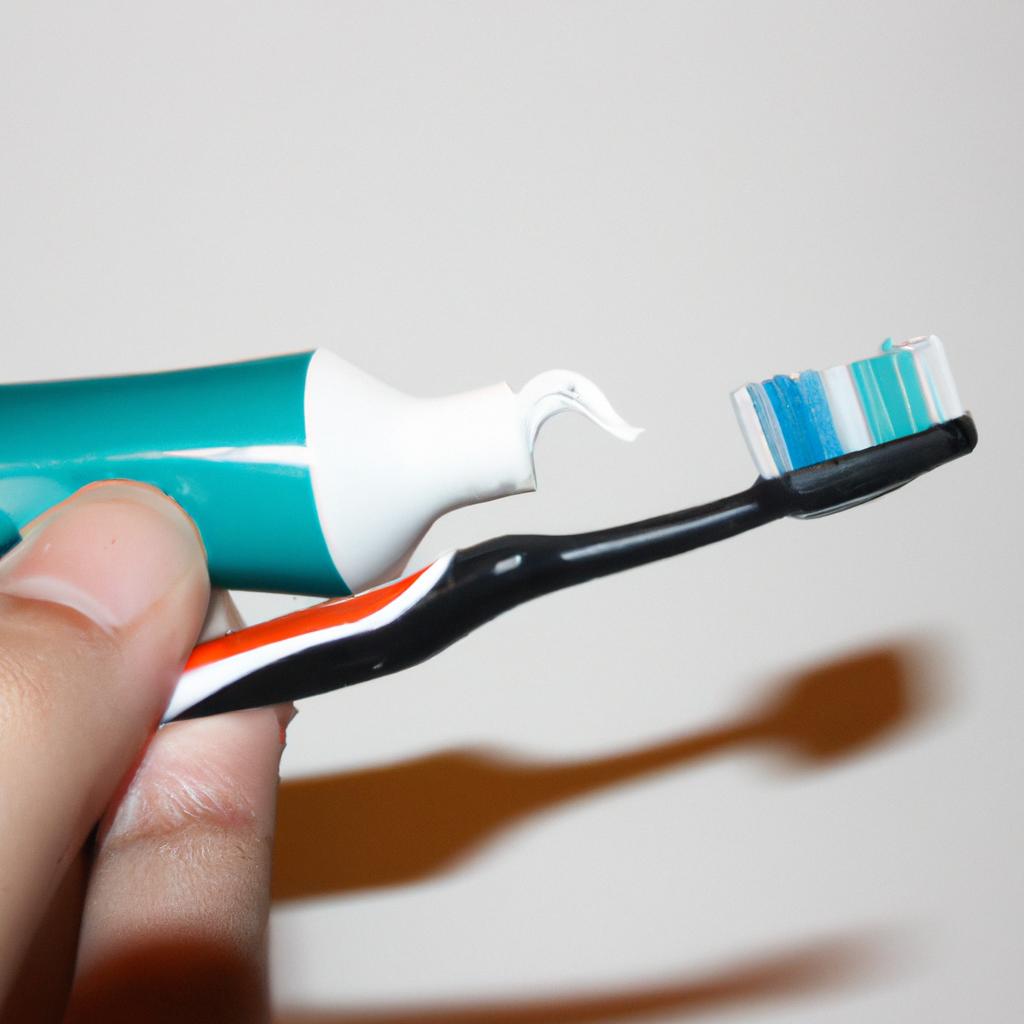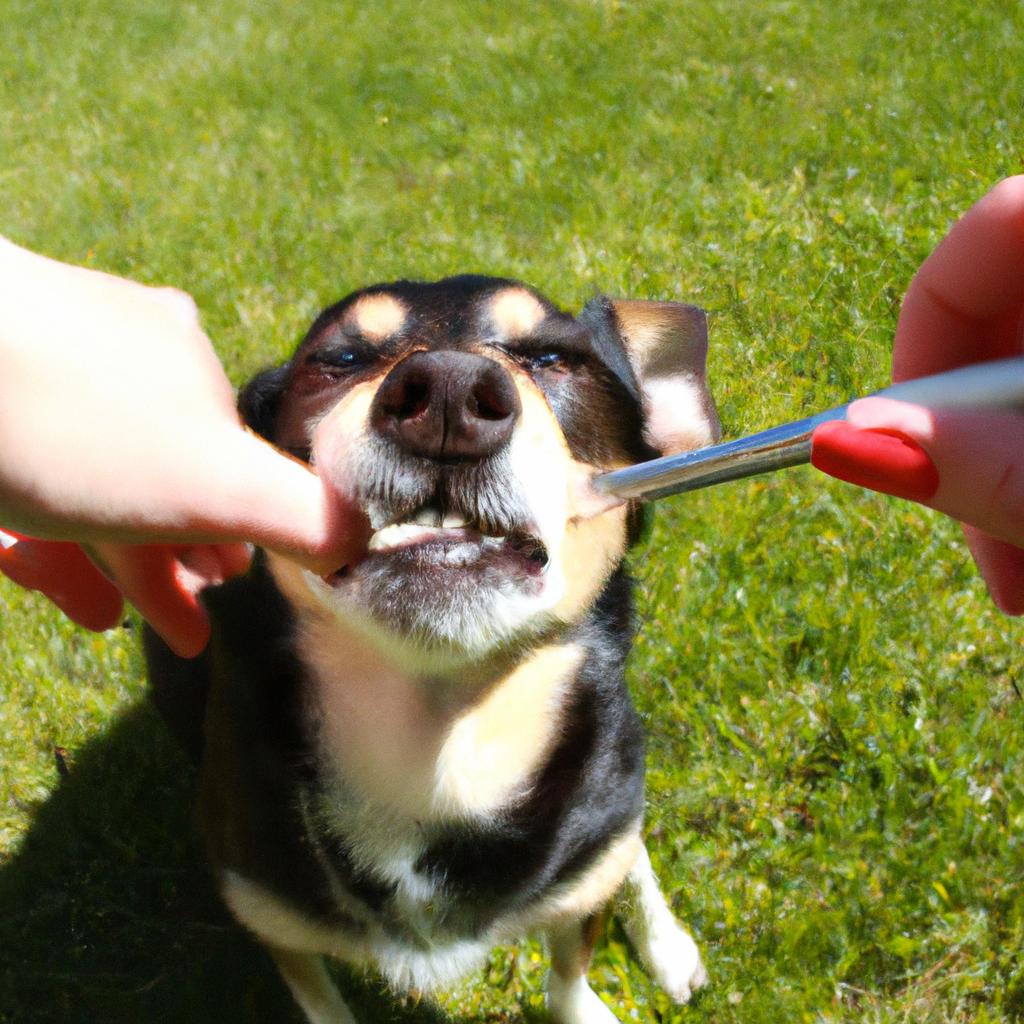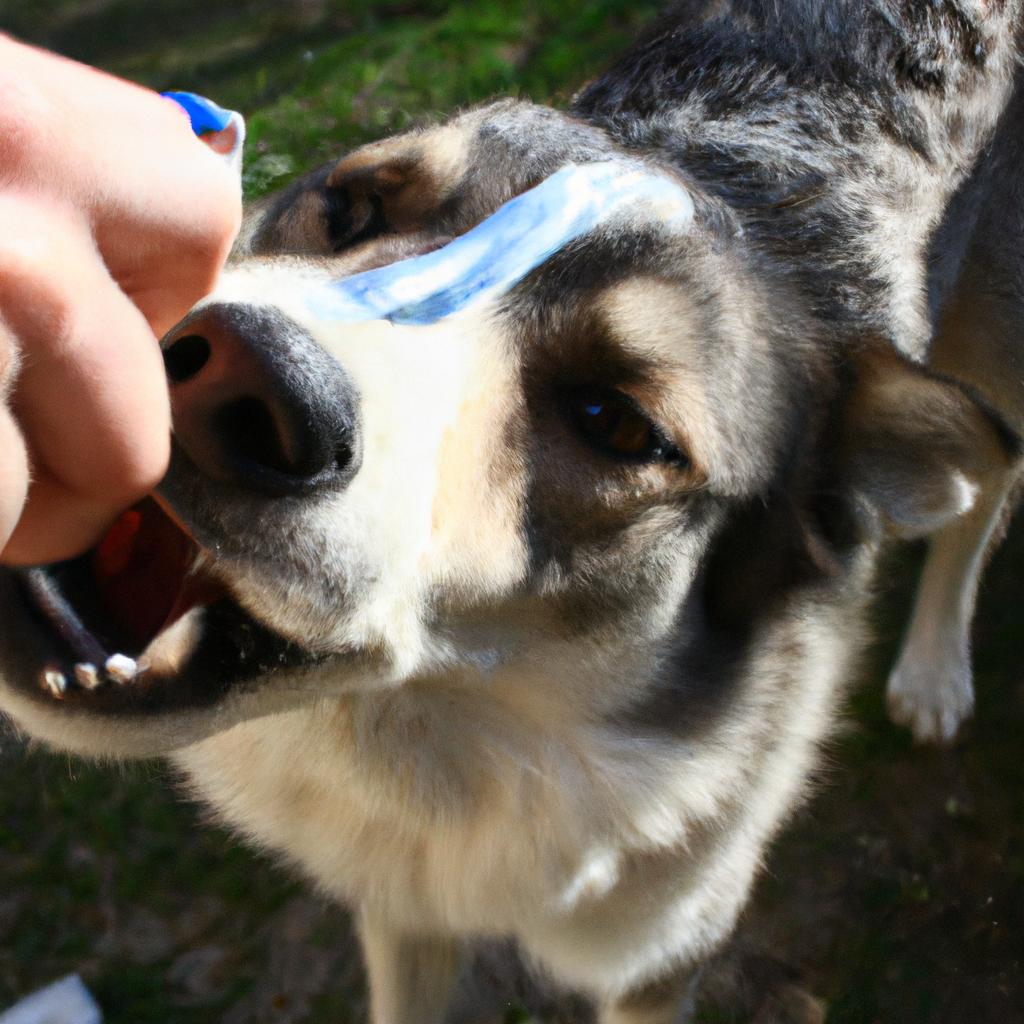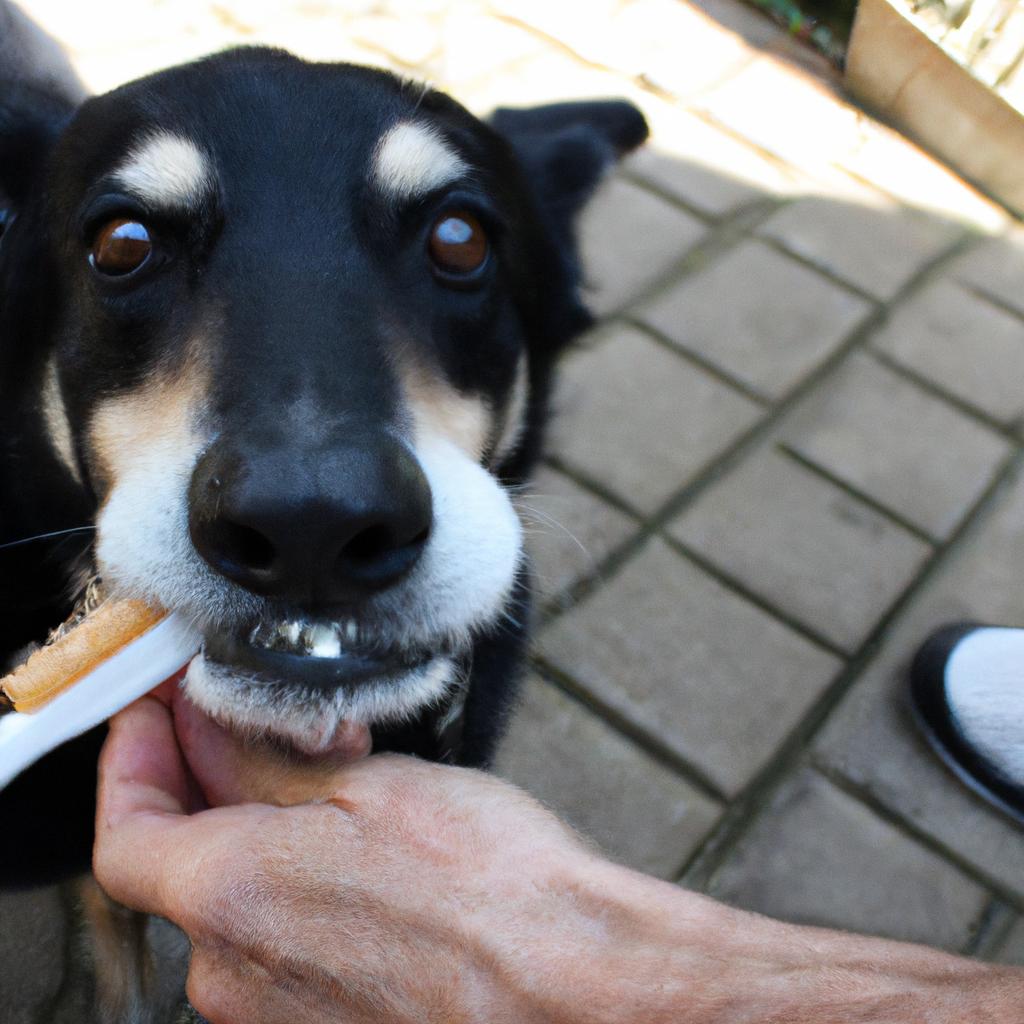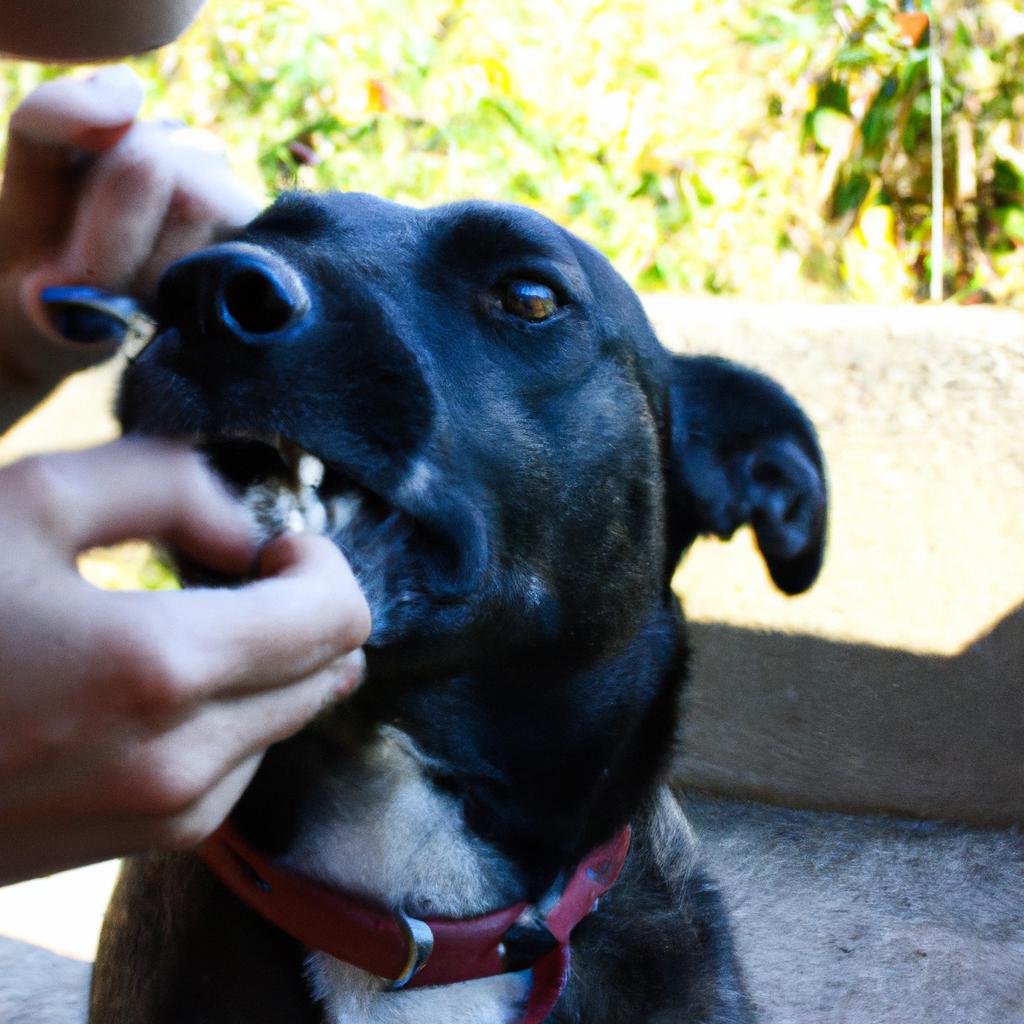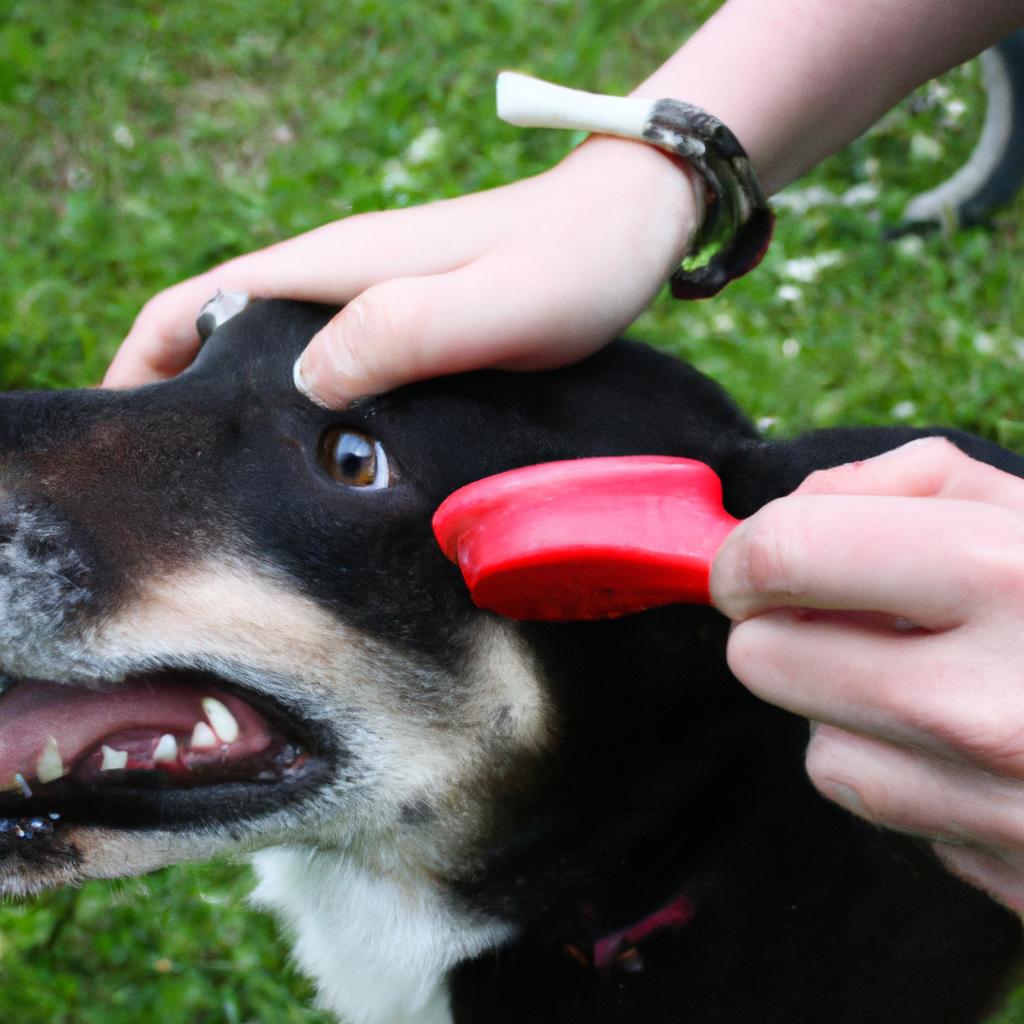Benefits of Regular Teeth Brushing for Dogs: The Importance in Dog Grooming Salons
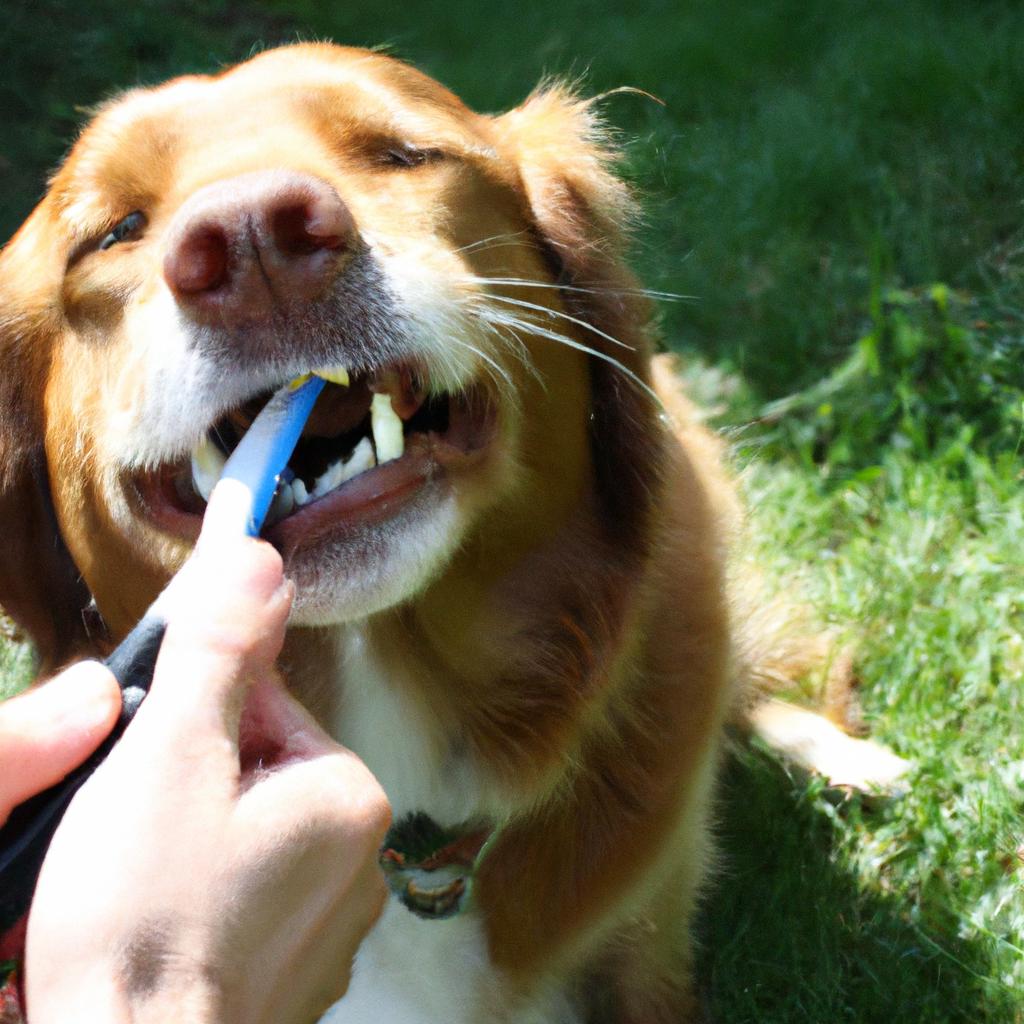
Regular teeth brushing is crucial for maintaining the oral health of dogs, and its significance in dog grooming salons cannot be overstated. For instance, consider the case of a five-year-old Labrador Retriever named Max who had never received regular teeth cleaning. Over time, Max developed severe dental problems such as tartar buildup, gum disease, and tooth decay. This not only caused him pain but also led to complications that affected his overall health and well-being. Hence, it is essential to understand the benefits of regular teeth brushing for dogs and recognize its importance within professional grooming settings.
Proper oral hygiene plays a vital role in preventing various dental issues commonly observed in canines. Dogs are prone to plaque formation on their teeth due to the accumulation of food particles and bacteria. Without regular brushing, this plaque hardens into tartar, which can lead to periodontal diseases like gingivitis or even more serious conditions like tooth loss or abscesses. Regular teeth brushing helps remove food debris and plaque from the surfaces of their teeth, reducing the risk of these detrimental consequences. Moreover, frequent brushing stimulates blood flow to the gums, improving their overall health by strengthening them against infections and inflammations.
In dog grooming salons specifically, incorporating regular teeth brushing In dog grooming salons specifically, incorporating regular teeth brushing into the grooming routine is crucial for maintaining the oral health of dogs. Groomers trained in proper teeth brushing techniques can help prevent dental issues and promote overall wellness in their canine clients.
By regularly brushing a dog’s teeth during grooming sessions, groomers can remove plaque and tartar buildup that can lead to gum disease and tooth decay. This not only improves the dog’s oral health but also prevents potential complications that may affect their overall well-being.
Additionally, professional grooming salons are equipped with specialized tools and products designed for effective teeth cleaning. Groomers can use toothbrushes and toothpaste formulated specifically for dogs, ensuring a safe and thorough cleaning process.
Regular teeth brushing at grooming salons also provides an opportunity for early detection of any dental problems. Groomers may notice signs such as bleeding gums, bad breath, or loose teeth, indicating the need for further veterinary attention.
Furthermore, incorporating regular teeth brushing into grooming sessions helps familiarize dogs with the process from a young age. This makes future home dental care easier for pet owners as dogs become accustomed to having their teeth brushed.
Overall, regular teeth brushing in dog grooming salons is essential for promoting optimal oral health and preventing dental issues that can impact a dog’s overall quality of life. It is an important aspect of professional grooming services that should not be overlooked.
Promotes oral health
Promoting oral health is a crucial aspect of regular teeth brushing for dogs, and it plays an essential role in maintaining their overall well-being. By implementing proper dental care practices, such as brushing your dog’s teeth on a routine basis, you can help prevent various oral issues that may arise over time.
For instance, consider the case of Max, a six-year-old Golden Retriever. Max’s owner consistently brushed his teeth every day using a specially formulated toothpaste for dogs. As a result of this diligent oral care routine, Max had healthier gums and cleaner teeth compared to other dogs of his age. The regular removal of plaque and tartar from Max’s teeth significantly reduced the risk of periodontal disease—a common condition among dogs—ensuring his continued optimal oral health.
To better understand the significance of regular teeth brushing for dogs, let us delve into some key benefits through an emotional lens:
- Fresh breath: Imagine being greeted by your furry friend with fresh breath instead of unpleasant odors! Regularly brushing your dog’s teeth helps combat bad breath caused by bacteria buildup.
- Pain prevention: Consider how painful it would be if you experienced toothaches regularly without any relief. Dogs are no different; they can suffer from dental pain due to infections or gum diseases. Proper oral hygiene minimizes the chances of such discomfort.
- Enhanced quality of life: Visualize your dog enjoying meals without hesitation or difficulty chewing due to dental problems. Maintaining good oral health contributes directly to their overall happiness and well-being.
- Financial savings: Reflect on the potential financial burden associated with treating advanced dental diseases in dogs. Preventive measures like regular brushing can save considerable expenses related to professional dental cleanings or extractions.
By incorporating these benefits into our understanding, we recognize the importance and value that regular teeth brushing brings to canine companions’ lives.
In transitioning to the next section about preventing dental diseases, we can begin to explore the various oral conditions that dogs may encounter and how regular teeth brushing acts as a preventive measure.
Prevents dental diseases
Regular teeth brushing for dogs is not only beneficial in promoting oral health but also plays a crucial role in preventing various dental diseases. By establishing a consistent dental care routine, dog owners can significantly reduce the risk of their furry friends developing oral issues. Let’s consider an example to understand the importance of regular teeth brushing:
Imagine a hypothetical scenario where a dog owner neglects to brush their pet’s teeth regularly. Over time, plaque and tartar start accumulating on the dog’s teeth, leading to gum inflammation known as gingivitis. If left untreated, gingivitis can progress into periodontal disease, which involves damage to the tissues supporting the teeth. This can eventually result in tooth loss or even systemic infections that may affect other organs.
To further emphasize the significance of regular teeth brushing for dogs, here are some key points:
- Prevents tooth decay: Regularly removing plaque from a dog’s teeth helps prevent cavities and reduces the chances of requiring costly dental treatments.
- Reduces risk of gum disease: Brushing removes bacteria-laden plaque from both above and below the gum line, reducing the likelihood of gum infections and subsequent complications.
- Decreases risk of heart and kidney problems: Periodontal disease has been linked to increased risks of heart disease and kidney dysfunction in dogs. Maintaining good oral hygiene through regular brushing can help minimize these risks.
- Enhances overall well-being: Healthy teeth and gums contribute to improved overall health by ensuring proper chewing function, pain-free eating experiences, and better breath.
To illustrate these benefits visually, refer to the following table:
| Dental Care Benefits | Description |
|---|---|
| Prevents tooth decay | Removing plaque reduces cavities |
| Reduces gum disease risk | Helps avoid bacterial infections |
| Decreases heart & kidney problems | Links between oral health conditions and systemic effects have been observed |
| Enhances overall well-being | Healthy teeth and gums provide pain-free eating experiences |
In conclusion, regular teeth brushing for dogs plays a vital role in preventing dental diseases. By implementing this simple yet effective practice, dog owners can safeguard their pets’ oral health and significantly reduce the risk of complications such as tooth decay, gum disease, and associated systemic issues. Next, we will explore how regular brushing contributes to reducing bad breath in dogs.
Reduces bad breath
Reducing Bad Breath: The Key to Fresh Doggy Kisses
Imagine this scenario: you come home after a long day, looking forward to spending quality time with your furry companion. As soon as you bend down to give them a warm greeting, an unpleasant odor wafts from their mouth, making it impossible for you to get close without cringing. This is where regular teeth brushing can make all the difference in preventing bad breath in dogs.
Bad breath, or halitosis, is not only off-putting but may also indicate underlying dental issues or poor oral hygiene. By incorporating regular teeth brushing into your dog’s grooming routine at professional dog salons, you can effectively combat this problem and ensure fresher kisses every time.
Here are some key reasons why reducing bad breath through regular teeth brushing is crucial:
- Improved Dental Health: Regular brushing helps remove plaque and tartar buildup on your dog’s teeth, which can lead to gum disease and tooth decay if left untreated.
- Prevention of Tooth Loss: Just like humans, dogs are susceptible to losing their teeth due to various dental diseases. Maintaining good oral hygiene through proper brushing can help prevent premature tooth loss in our canine companions.
- Enhanced Overall Well-being: A healthy mouth contributes to better overall health for your dog by reducing the risk of developing systemic conditions such as heart disease and kidney problems.
- Better Social Interactions: Nobody wants their beloved pet ostracized because of offensive breath! By addressing bad breath through regular brushing, you can promote positive social interactions between your dog and other pets or people they encounter.
To further emphasize the importance of maintaining fresh breath for dogs, consider the following table highlighting the benefits of regular teeth brushing:
| Benefits | Description |
|---|---|
| Fresher Breath | Enjoy closer interactions with your pup without being put off by unpleasant odors |
| Reduced Dental Issues | Minimize the risk of gum disease, tooth decay, and other oral health problems |
| Improved General Health | Promote overall well-being by reducing the likelihood of systemic diseases |
| Enhanced Social Life | Ensure your dog is always ready for playdates or cuddles with others, without judgment |
By incorporating regular teeth brushing into your dog’s grooming routine at professional salons, you can effectively address bad breath while reaping a multitude of benefits. Next, we will explore how this simple yet vital practice improves their overall well-being.
Improving Overall Well-being: The Gateway to a Happier Dog
Improves overall well-being
Section H2: Improves overall well-being
Regular teeth brushing not only helps to reduce bad breath in dogs but also contributes significantly to their overall well-being. By maintaining good oral hygiene, dog owners can ensure that their furry friends stay healthy and happy.
One example of the positive impact of regular teeth brushing is seen in a case study involving a Labrador Retriever named Bella. Prior to implementing a daily dental care routine, Bella suffered from persistent gum inflammation and tooth decay. However, once her owner started regularly brushing her teeth using veterinarian-approved toothpaste, Bella’s oral health improved dramatically. The reduction in plaque buildup and tartar accumulation led to healthier gums and stronger teeth for Bella, ultimately enhancing her overall well-being.
In addition to specific instances like Bella’s case study, there are several general benefits associated with regular teeth brushing for dogs:
- Reduces the risk of periodontal disease: Regularly removing plaque and tartar from a dog’s teeth through brushing helps prevent the development of periodontal disease. This condition can lead to painful infections, loss of teeth, and even damage to vital organs such as the heart and kidneys.
- Prevents discomfort during eating: Dogs with poor oral health may experience pain or discomfort while eating due to gum inflammation or dental issues. Regular teeth brushing can alleviate these problems, allowing them to enjoy their meals without any hindrance.
- Enhances overall longevity: Good oral hygiene directly impacts an animal’s lifespan by reducing the risk of systemic diseases caused by untreated dental issues. By incorporating regular teeth brushing into their grooming routine, dog owners contribute to their pet’s long-term health and quality of life.
To further emphasize the importance of regular teeth brushing for dogs’ overall well-being, consider the following table:
| Benefits of Regular Teeth Brushing |
|---|
| 1. Improved digestion |
| 2. Reduced risk of infection |
| 3. Enhanced energy levels |
| 4. Increased overall happiness |
By following these guidelines for regular teeth brushing, dog owners can significantly enhance their furry companion’s well-being and ensure a healthier, happier life.
A crucial aspect of maintaining good oral hygiene in dogs is the positive impact it has on their relationship with their owners. Enhances bonding with the owner…
Enhances bonding with the owner
Regular teeth brushing not only improves a dog’s oral health but also has a positive impact on their overall well-being. Take the case of Max, a three-year-old Golden Retriever who had never received proper dental care until his owner started brushing his teeth regularly. Before this new routine, Max would often experience bad breath and discomfort while eating. However, after consistent teeth brushing sessions, these issues gradually disappeared, resulting in improved appetite and increased energy levels.
One significant benefit of regular teeth brushing for dogs is the prevention of periodontal disease. This common condition can lead to gum inflammation, tooth loss, and even bacterial infections that may spread throughout the body. By maintaining good dental hygiene through regular brushing, owners can significantly reduce the risk of periodontal disease in their furry companions.
Furthermore, regular teeth brushing helps prevent tartar buildup on dogs’ teeth. Tartar is a hard deposit that forms when plaque mineralizes over time if left untreated. Not only does it cause discoloration and foul odor but it also provides an ideal environment for bacteria to thrive. Through consistent brushing with canine-specific toothpaste and brushes, pet parents can effectively remove plaque before it hardens into tartar.
In addition to these benefits, here are some key reasons why regular teeth brushing should be incorporated into every dog’s grooming routine:
- Reduces the likelihood of developing painful toothaches or abscesses.
- Helps maintain fresh breath and pleasant smelling kisses.
- Promotes healthy gums by stimulating blood flow.
- Enhances overall appearance with clean and bright teeth.
To further emphasize the significance of regular teeth brushing in dog grooming salons, consider the following table depicting potential consequences of neglecting dental care:
| Neglected Dental Care | Potential Consequences |
|---|---|
| Bad breath | Unpleasant interactions |
| Gum inflammation | Reduced quality of life |
| Tooth loss | Difficulty eating and chewing |
| Bacterial infections | Increased risk of systemic diseases |
By prioritizing regular teeth brushing, dog owners can ensure their furry friends enjoy a healthier and more comfortable life. This simple yet effective practice not only improves oral health but also contributes to the overall well-being of our beloved companions.
As we have seen the numerous benefits regular teeth brushing provides for dogs, it is equally important to acknowledge the financial advantages that arise from this essential grooming routine. Incorporating regular dental care into your pet’s routine saves money on veterinary bills.
Saves money on veterinary bills
Building a strong bond between dogs and their owners is crucial. However, regular teeth brushing not only strengthens this bond but also provides numerous health benefits to our furry friends. In dog grooming salons, prioritizing dental care can lead to improved overall well-being and prevent potential oral health issues that could result in costly veterinary bills.
Section:
Regular teeth brushing offers several advantages for dogs’ dental hygiene and general health. For instance, let’s consider a hypothetical case study involving Roxy, a nine-year-old Labrador Retriever. Before her owner started regularly brushing her teeth at home and taking her to the local grooming salon for professional dental cleaning every six months, she experienced recurring gum infections and bad breath. However, after implementing these practices, Roxy’s oral health significantly improved as plaque buildup was reduced, preventing further complications.
To emphasize the importance of regular teeth brushing in dog grooming salons, here are some key points to consider:
- Prevention of periodontal disease: Consistent toothbrushing removes plaque and tartar buildup on dogs’ teeth, reducing the risk of developing periodontal disease—a common condition among canines.
- Minimization of bad breath: Proper oral hygiene helps eliminate foul odor caused by bacteria accumulation in the mouth.
- Improved overall health: Dental diseases can affect more than just a dog’s mouth—they have been linked to systemic conditions such as heart disease and kidney problems.
- Enhanced quality of life: Maintaining healthy teeth allows dogs to enjoy pain-free chewing abilities and better digestion.
Furthermore, incorporating regular teeth brushing into the services provided by dog grooming salons creates an environment where pet owners can access specialized expertise while ensuring their pets receive comprehensive care. To illustrate this point effectively, below is a table showcasing how dog grooming salons contribute to the overall dental care of our canine companions:
| Benefits of Dog Grooming Salons in Dental Care |
|---|
| Professional expertise and guidance |
| Access to specialized oral health products |
| Regular check-ups for early detection of issues |
| Availability of professional dental cleaning |
In conclusion, regular teeth brushing not only improves bonding between dogs and their owners but also plays a significant role in maintaining optimal oral hygiene. By prioritizing this practice within dog grooming salons, pet owners can ensure their furry friends receive proper dental care while preventing potential complications that may lead to costly veterinary bills. Remember, a little effort today can go a long way in securing your dog’s well-being tomorrow.

